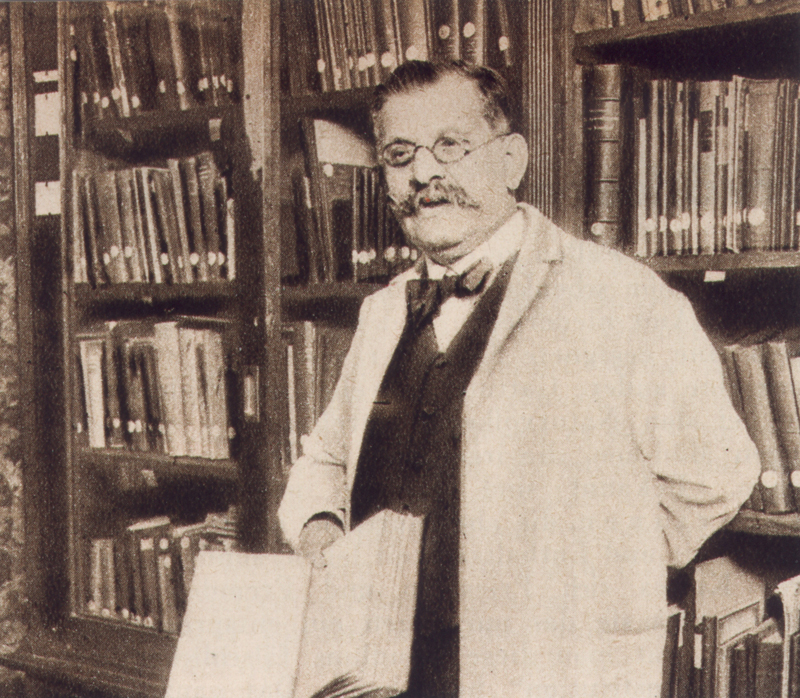Magnus Hirschfeld wuchs in einer kinderreichen jüdischen Familie auf. Sein Vater war ein angesehener Arzt und Mitglied der jüdischen Gemeinde Kolberg in Pommern, seit 1871 ihr Vorsitzender. 1887 bis 1892 studierte Magnus Hirschfeld zunächst Philologie, anschließend Medizin in Breslau, Straßburg, München, Würzburg und Berlin.
1896 eröffnete er in Berlin eine naturheilkundliche Praxis. Gleichzeitig war er Redakteur der Wochenzeitschrift „Der Hausdoktor“ und publizierte eine grundlegende Studie „Sappho und Sokrates oder Wie erklärt sich die Liebe der Männer und Frauen zu Personen des eigenen Geschlechts?“ über die „sexuellen Zwischenstufen“ von Männern und Frauen. 1899 bis 1923 gab er das Jahrbuch für sexuelle Zwischenstufen heraus. 1897 gründete er das „Wissenschaftlich-humanitäre Komitee“ (WhK), dessen Vorsitz er bis 1929 führte. Als weltweit erste Organisation setzte sie sich für die Entkriminalisierung von Homosexualität ein.
Im Ersten Weltkrieg diente Hirschfeld als Lazarett-Arzt. Nach seiner Rückkehr gründete er 1919 in Berlin das „Institut für Sexualwissenschaft“ mit einer umfassenden Spezialbibliothek und einer Beratungsstelle für Menschen mit sexuellen Problemen. Fortan trat Hirschfeld deutschlandweit mit Veröffentlichungen, Gerichtsgutachten und Tagungen an die Öffentlichkeit.
Als Jude, Homosexueller und Sozialist wurde er zur Zielscheibe bösartiger Anfeindungen. Am 4.10.1920 überfielen Nationalsozialisten Magnus Hirschfeld nach seinem Vortrag in der Münchner Tonhalle und schlugen ihn bewusstlos. Seit Mitte der 1920er-Jahre hielt sich Magnus Hirschfeld für Vortragsreisen im Ausland auf. 1930 entschied er sich, von einer Reise aus den USA nicht mehr nach Deutschland zurückzukehren und emigrierte 1932 in die Schweiz. Im Zuge der Bücherverbrennung in Berlin verwüsteten Nationalsozialisten im Mai 1933 das Berliner Institut für Sexualforschung. Seit 1934 lebte Magnus Hirschfeld in Nizza und starb dort 1935.
Nach 1945 blieben Magnus Hirschfeld und sein Werk in Deutschland jahrzehntelang vergessen. Erst mit der homosexuellen Emanzipationsbewegung seit den 1970er-Jahren wurde auch der Aktivist und Sexualforscher Hirschfeld in Deutschland wiederentdeckt. 1982 gründeten Mitglieder der Schwulen- und Lesbenbewegung in West-Berlin die Magnus-Hirschfeld-Gesellschaft, die sich der Erforschung des Instituts für Sexualforschung und dessen Gründer wie auch die Etablierung der Geschlechterforschung zum Ziel gesetzt hat. 2011 erfolgte die Gründung der Bundesstiftung Magnus Hirschfeld zur Erforschung der gesellschaftlichen Lebenswelt von Lesben, Schwulen und transgeschlechtliche Menschen sowie der Förderung von Bildungs- und Öffentlichkeitsarbeit gegen die Diskriminierung dieser Menschen.


